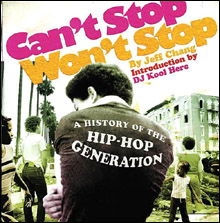 The journalist, activist, and SoleSides label founder Jeff Chang’s Can’t Stop, Won’t Stop: A History of the Hip-Hop Generation (recently released in paperback) has been described by more than a few people as the best book every written on the subject. His next book, Total Chaos: The Art and Aesthetics of Hip-Hop, is due later this year. Brian Coleman is a longtime hip-hop critic (for XXL, URB, and the Phoenix, among many others) and DJ (on WZBC). He’s the author of the acclaimed oral history Rakim Told Me: Wax Facts Straight from the Original Artists. In advance of a talk Chang gave at Tufts University on March 3, the Phoenix got the two authors on the phone to talk about the state of rap criticism. See the sidebar at right to download the conversation in mp3/podcast form.
The journalist, activist, and SoleSides label founder Jeff Chang’s Can’t Stop, Won’t Stop: A History of the Hip-Hop Generation (recently released in paperback) has been described by more than a few people as the best book every written on the subject. His next book, Total Chaos: The Art and Aesthetics of Hip-Hop, is due later this year. Brian Coleman is a longtime hip-hop critic (for XXL, URB, and the Phoenix, among many others) and DJ (on WZBC). He’s the author of the acclaimed oral history Rakim Told Me: Wax Facts Straight from the Original Artists. In advance of a talk Chang gave at Tufts University on March 3, the Phoenix got the two authors on the phone to talk about the state of rap criticism. See the sidebar at right to download the conversation in mp3/podcast form.
PHOENIX:
You’re each writing about hip-hop from different perspectives. Jeff, yours is this broad, epic social history, and Brian, your book focuses on the specifics of particular pieces of music. The question is for both of you: what led you to these different approaches and what were some of the benefits and drawbacks of those approaches?
JEFF CHANG: My writing, going all the way back to 1990-1991, has always been influenced by my activism, so for me hip-hop was inseparable from who I was and what I believed in. The book came out the way it did just as a natural outgrowth — that’s who I am, that’s my voice, and that’s what I figured I was adding to the world. And it’s not to say that my approach is any better or any worse than anybody else’s — it’s just the way that I went about doing things.
The thing I love about Brian’s [book], the reason I love Rakim Told Me so much, is because it captures just the utter joy of it — of listening to that music for the first time. And it shows that there’s a craft to hip hop. People just think that, “Oh, they just sample this music, and they write some words, and they make it rhyme in couplets,” yada-yada-yada. But there’s so much to the art of hip-hop, and there’s not a lot of writing — in fact there’s very little writing about that, especially in the artists’ own words. So when I got Brian’s book I got just as geeked out as I was, you know, back when I was listening to the records for the first time.
PHOENIX: Brian, you billed your book as the liner notes for [those] records that were never written. It does seem amazing that nobody has ever tried to do something like this.
BRIAN COLEMAN: Well, Jeff, first of all, thanks a lot, and you know I think [for] both of us the key, really, to any subject, is to come at it as a fan, and that’s gotta be first and foremost no matter what you’re actually writing about . . . and I think that passion comes across in Jeff’s work for sure, and hopefully in mine too. So I guess in a way the idea came about before I even started writing, where you would have these records and you listened to them — personally, I always just wanted to know more. You’d get magazine articles here and there but you’d always kinda wonder. As I was [writing] different articles over the years I’d wonder whether, if you find out more about these artists and more about these albums, if that’s gonna demystify a little bit about what the artists are about, or about what the albums and the music is about, and that didn’t happen. I don’t think it happened even once in my experience, which makes it even better. My goal is to look at hip-hop producers and MCs and everyone who makes hip-hop music at artists. And especially in this day in age, the way that I think a lot of the coverage is, its not really done, and that’s really sad.
A lot of the parts of Jeff’s book that I really enjoy are talking about the beginnings of hip-hop journalism and talking about pioneers . . . you know the part about the Source is really fascinating I think — the way they started out, and obviously even in recent months how things keep getting weirder and weirder over there. It’s sad, but it’s also important to remind people about what true hip-hop journalism and what all music journalism should be about. It’s not about flash or people’s images, and I certainly tried to avoid that if I could, and just get right to the music, ’cause I think that’s what fans really want to know about.
PHOENIX: I think of you guys as being a sort of second-wave of hip hop criticism. But where do you guys see yourselves in the continuum of writing about hip hop?